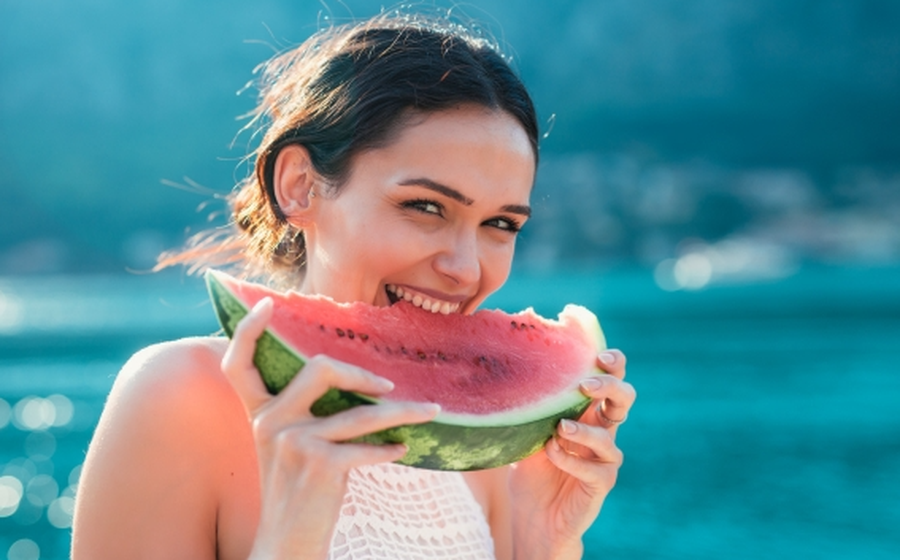
Start your day with a light and hydrating breakfast, preferably with yogurt and fresh fruit. Avoid fatty or overly processed foods and instead choose foods with a high water content, which are helpful in replenishing fluids lost through sweating, such as watermelon, cantaloupe, cucumbers, and squash.
Even ice cream can be a summer snack, provided it is consumed in small portions and without additives. "In general, to combat the heat, it is advisable to follow a light diet rich in fluids and minerals, consuming plenty of fresh seasonal fruits and vegetables," emphasizes Laura Rossi, director of the Department of Food, Nutrition and Health of the National Institute of Health in Italy, who has prepared a specific manual on combating the heat with proper nutrition.
1. Hydration
Drink at least 2 liters of water a day, preferably between meals, to stay hydrated. Heat and increased sweating increase the risk of dehydration, making the 2-liter-a-day rule even more necessary. It is important to drink regularly throughout the day, without waiting until you feel thirsty, which is already a sign of dehydration.
2. Fruits and vegetables
Eat generous portions of fresh fruits and vegetables ( you can reach about 1 kg of fruits and vegetables per day, including meals and snacks ), preferably seasonal, as they are rich in vitamins and minerals. Foods such as watermelon, cantaloupe, cucumbers, pumpkins, peaches, strawberries, cherries, apricots, figs, berries, tomatoes, eggplant and celery are particularly suitable.
3. Low-calorie meals
Choose light and easily digestible meals, such as mixed salads, cold pasta with vegetables, simply cooked and lightly seasoned fish, white meat or legumes.
" Avoid full menus with a first course, a second course, and a side dish ," recommends Dr. Rossi.
" Especially when traveling or staying at a hotel, the variety of buffets can encourage overeating. It is better to choose a single main course, alternating between lunch and dinner, always accompanying them with a side dish, creating one-pot meals that are balanced and rich in nutrients. Possible combinations include pasta with legumes and/or vegetables, rice with vegetables, meat with salad, fish with vegetables and/or eggs with vegetables, and so on. "
It is helpful to limit your consumption of high-fat foods, fried foods, sauces, or overly processed dishes that can make digestion more difficult.
4. Don't skip breakfast
It is an essential meal, even in summer, when the heat can lead to neglect. It is better to avoid breakfasts that are too rich in sugar and fat, opting instead for a balanced diet. To combat the heat, plain yogurt and fresh seasonal fruit are recommended, perhaps accompanied by a small portion of dried fruit and cereals.
5. Limit salt
Reduce your salt intake, preferring iodized salt and moderating the use of very tasty sauces and spices.
6. Avoid alcohol and sugary drinks
They can contribute to dehydration and slow digestion. Their thirst-quenching effect is only apparent, while the sugar content is real. The same goes for cocktails and sugary sodas. On the other hand, iced teas made with seasonal fruits and herbs are preferred, as they are lighter and naturally refreshing.
7. Fresh foods
Include them in your diet and they can consist of yogurt, fresh fruit, smoothies or vegetable juices, to maintain a constant intake of fluids and nutrients.
8. Yes, ice cream, but in moderation
"It can be a great appetizer as long as it's small; otherwise, it's a meal replacement," suggests Rossi.
" Choose plain ice creams, limiting the addition of sprinkles or chocolate coatings. Let's dispel a myth: we don't think that fruit flavors can be consumed more than cream flavors: the caloric difference is actually small, around 20-30 calories."
Even nuts, such as almonds, hazelnuts or peanuts, can be a healthy summer snack, as long as they are consumed in sufficient portions - about 30 grams - and in their natural form, without added salt or sugar.
9. Pay attention to food storage
For perishable foods, it is essential, especially when planning a picnic or a day at the beach, to bring food from home. Heat accelerates food spoilage, increasing the risk of contamination and food poisoning. Maintaining the cold chain for all products that require it and properly storing food in the refrigerator are essential. Proper storage not only protects the health of those who consume the food, but also helps preserve its nutritional properties.
10. Green light for legumes
They are an important source of plant-based protein. They are consumed mainly during the cold months, but can also be integrated into the diet during the summer: added to salads, served as a side dish, used in cold soups or made into light creams. Along with plant-based proteins, animal proteins are also important, with a preference, during the warmer months, for sources that are less fatty and low in salt.
Seasonal fish, those that are not in the reproductive phase, such as sea bass, sole, sea bass and sardines, and white meats are ideal. It is best to limit your consumption of red meat and canned meats, which are high in salt and saturated fat. (A2 Televizion)











